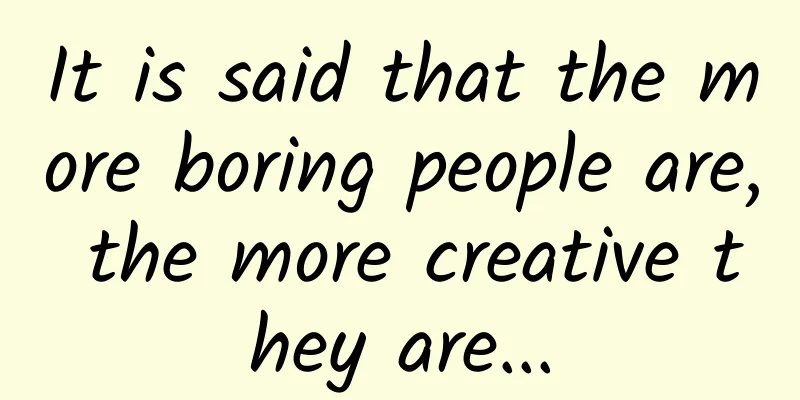It is said that the more boring people are, the more creative they are...

|
Audit expert: Li Xianhong National Level 2 Psychological Counselor "It's so boring." When I was a kid, I would have this thought in every drowsy class and on weekends when I was locked up at home doing homework. When I grew up a little, I found that this thought would also appear in group activities with a dull atmosphere. Now, what would make you bored? A meeting that never ends? A conversation that doesn't spark any new ideas? A power outage afternoon with nothing to do? For some reason, modern people are particularly prone to boredom and are particularly afraid of being bored. Those of us who have experienced boredom know that it is painful, and every slogan of "cherishing time" adds anxiety to this pain. So, what exactly is boredom? How does boredom arise? Both Schopenhauer and Kierkegaard considered boredom to be a “specific evil” of modern life. Different types of boredom occur in different situations. When you feel listless in the face of something you are not interested in, it is situational boredom; and the sense of loss you feel after coming back to your senses from an exciting movie is considered to be satiation boredom. But in fact, boredom is not entirely affected by the outside world. The root cause of boredom can be traced back to the failure to establish sufficient sense of security in infancy. Source: Tuchong Creative Scientists have found that when people feel bored, the activity of the anterior insular cortex of the brain decreases. The insula can be seen as a person's "desire commander", which constantly monitors the body's desire for food and other things, prompting us to respond to meet these needs. When we feel bored, our response to external stimuli will also decrease, entering a state of "no desire and no demand". Positive boredom can stimulate creativity. From a physiological point of view, timely and appropriate boredom is actually a good thing. Studies have shown that people are most creative when they are bored. Source: Tuchong Creative The default mode circuit system (DMN) in the human brain is active when you feel bored. This system is the basis of the "self-cognition" neural system, which affects your memory, self-description and emotional state. More importantly, it will sort out the timeline and storyline to help you understand what happened to you, and these tasks will inevitably affect your creativity. The Tetris game that you loved so much when you were a child was invented by a Soviet man named Pajitnov who spent 7 days typing out codes during a boring holiday. Nowadays, we often use various social media and mobile news to fill our free time. Various mobile games, escape rooms and other novel entertainments are also trying to occupy our rest time, so that we are no longer afraid of "boredom". However, at this time, our brain is still working and receiving information non-stop. In the long run, it will make our body and mind in a relatively tired state, affecting our concentration and creativity. Therefore, it is also a healthy pleasure to empty your mind appropriately, daydream, and learn to enjoy "boredom". Negative boredom can make people depressed, but there is also a very negative kind of "boredom", which is not just "nothing to do", but a psychological barrier. Have you heard of the concept of "learned helplessness"? It was first proposed by Seligman, a professor of psychology at the University of Pennsylvania. It refers to the phenomenon that people or animals feel uncontrollable after facing repeated setbacks, blows and other bad things, and thus gradually learn to give up and feel hopeless. Source: Tuchong Creative American scholar Carol Dweck was the first person to conduct a study on learned helplessness in children. In the process of constantly increasing the difficulty of word puzzles and intelligence jigsaw puzzles for primary and secondary school students, he found that some children always tended to feel that they were not smart enough to complete the game. On the contrary, other children showed a positive side to failure. They would suggest to themselves that "I am just a little bit away" and "I like to face challenges" to urge themselves to bravely face difficulties and move forward. There are many factors that can lead to this mentality, and the influence of the surrounding environment cannot be ignored. Women who suffer domestic violence or children who are raised under strict family education are prone to falling into a state of learned helplessness. Learned helplessness is accustomed to making misattributions from three perspectives: personal, pervasive, and permanent. That is, they believe that all problems are caused by themselves, that the problems have a profound and extensive impact on them, and that the problems can never be changed. These three "beliefs" are summarized as "3PS", which are the three basic differences between learned helplessness and other people when looking at problems. Recognizing these three factors can help learned helplessness get out of this dilemma. The key is that we need to realize that life is not a stagnant pool of water, nor is it a set code. People themselves are individuals who are shaped after countless successes and failures. Every momentary decision will more or less affect the trajectory of your life, and the only chance to sail out of the storm lies in the firm belief in your hands. |
<<: Danger! Don’t use this kind of light casually, it may cause blindness!
Recommend
Xue Song Behavioral Finance, Vol. 1
Xue Song's Behavioral Finance, Issue 1 Resour...
Xiaomi rice cooker cooking test: a little disappointing
Xiaomi released the Mijia Pressure IH Rice Cooker...
"Foreign Language Restriction Order" implemented, video websites turn to self-produced dramas
Foreign dramas often adopt a system of filming wh...
Analysis of isolated storage mechanism in Windows Phone 8
【51CTO translation】The role of the isolated stora...
Following orders and serving others...When will robots truly replace human labor?
In today's era, technology is developing rapi...
The F-35B crashed on the Queen Elizabeth, and the surveillance video was leaked. The British are stupid now.
There is still no conclusion to the incident of t...
Bats love to hang upside down, how do they poop?
As we all know, bats hang upside down to rest, so...
After watching "Tucao Conference", I learned the real trick to increase conversion rate by 200%!
"Look, after not seeing you for a long time,...
Baidu Smart Mini Programs are a new traffic hotspot
What is Baidu Smart Mini Program? Baidu Smart Min...
SEM small search delivery guide: bidding small channels
In SEM, there are five main promotion channels: B...
WeChat vs. TikTok: Analysis report on 4 major categories!
In 2019, WeChat’s monthly active users reached 1....
What are the SEO marketing methods?
As the saying goes, "Even good wine needs to...
Jiayuan.com may be responsible for Su Xiangmao's death
Recently, the suicide of WePhone developer Su Xia...
Is Android about to be taken away?
[[129203]] When Cyanogen CEO Kirt McMaster announ...
An unexpected discovery: Cancer cells are more active when we sleep?
Some scientists stay up until the early hours of ...









